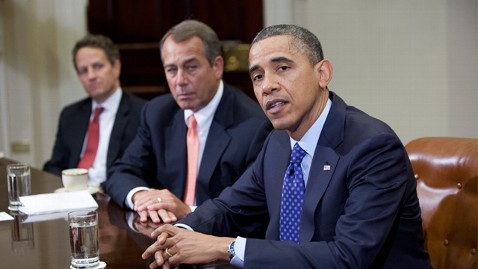For the first time in more than three weeks, President Obama and House Speaker John Boehner met face-to-face today at the White House to talk about avoiding the fiscal cliff.
White House Principal Deputy Press Secretary Josh Earnest would offer no details saying only, "The lines of communication remain open."
Erskine Bowles, the co-creator of a debt reducing plan, who was pessimistic a couple weeks ago, said he likes what he's hearing.
"Any time you have two guys in there tangoing, you have a chance to get it done," Bowles said on CBS's "Face the Nation."
The White House afternoon talks, conducted without cameras or any announcement until they were over, came as some Republicans were showing more flexibility about approving higher tax rates for the wealthy, one of the president's demands to keep the country from the so-called fiscal cliff -- a mixture of across-the-board tax increases and spending cuts that many economists say would send the country back into recession.
Carolyn Kaster/AP Photo; Pablo Martinez Monsivais/AP Photo
Fiscal Cliff Battle: President Obama vs. Speaker John Boehner Watch Video
"Let's face it. He does have the upper hand on taxes. You have to pass something to keep it from happening," Sen. Bob Corker of Tennessee said on "FOX News Sunday."
This comes after the White House moderated one of its demands about tax rate increases for the wealthy.
The administration was demanding the rate return to its former level of 39.6 percent on income above $250,000. The so-called Bush tax cut set that rate at 35 percent. But Friday, Vice President Joe Biden signaled that rate could be negotiable, somewhere between the two.
"So will I accept a tax increase as a part of a deal to actually solve our problems? Yes," said Oklahoma Republican Tom Coburn on ABC's "This Week."
The problems the senator was referring to are the country's entitlement programs. And there was some progress on that front, too.
A leading Democrat said means testing for Medicare recipients could be a way to cut costs to the government health insurance program. Those who make more money would be required to pay more for Medicare.
"I do believe there should be means testing, and those of us with higher income and retirement should pay more. That could be part of the solution," Sen. Dick Durbin of Illinois said on NBC's "Meet the Press."
But Durbin said he would not favor raising the eligibility age from 65 years old to 67 years old, as many Republicans have suggested.
The White House and the speaker's office released the exact same statement about the negotiating session. Some will see that as a sign of progress, that neither side is talking about what was said behind closed doors.










